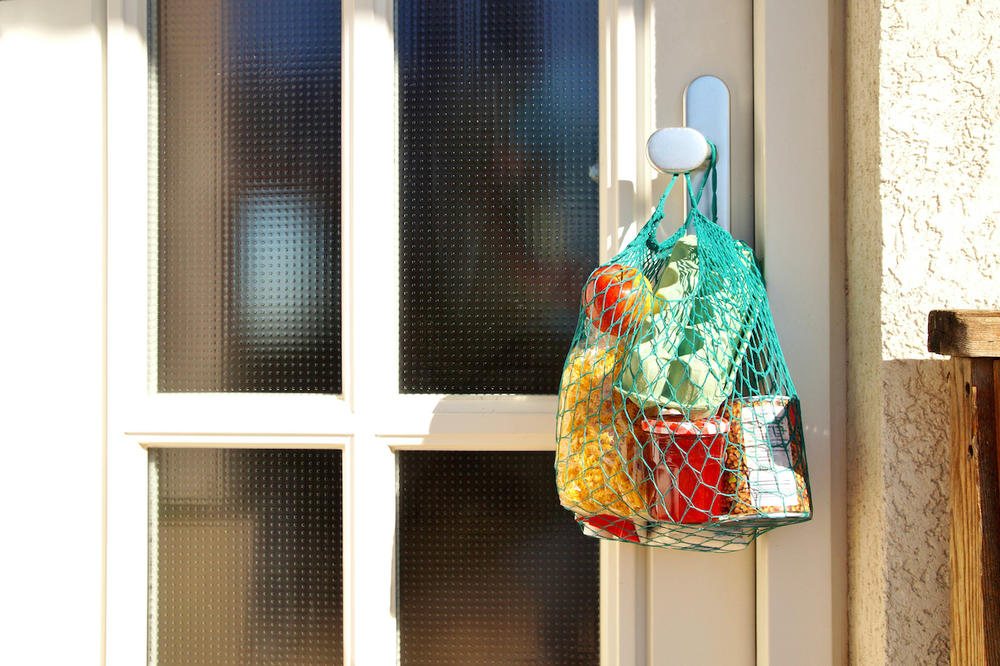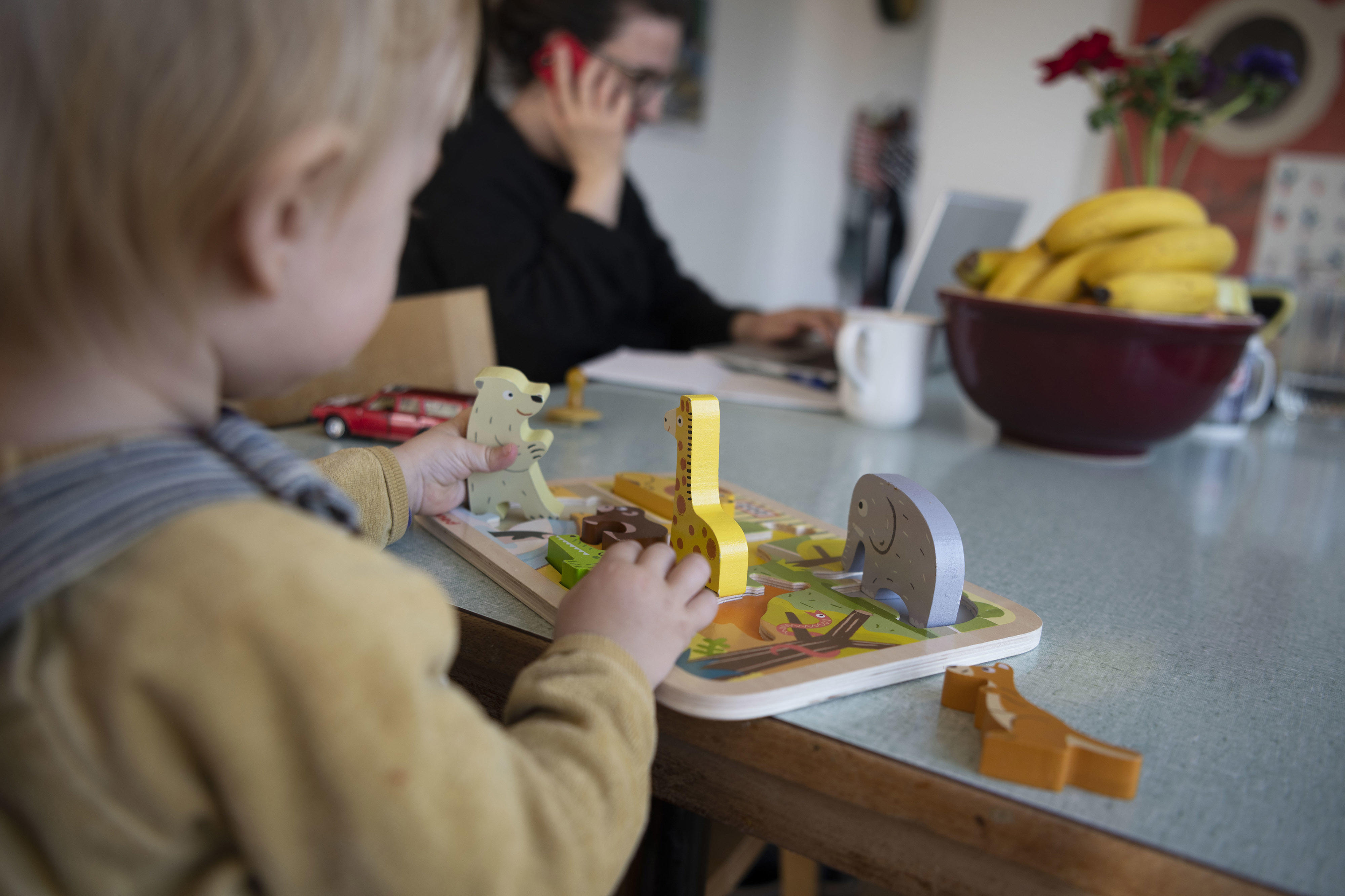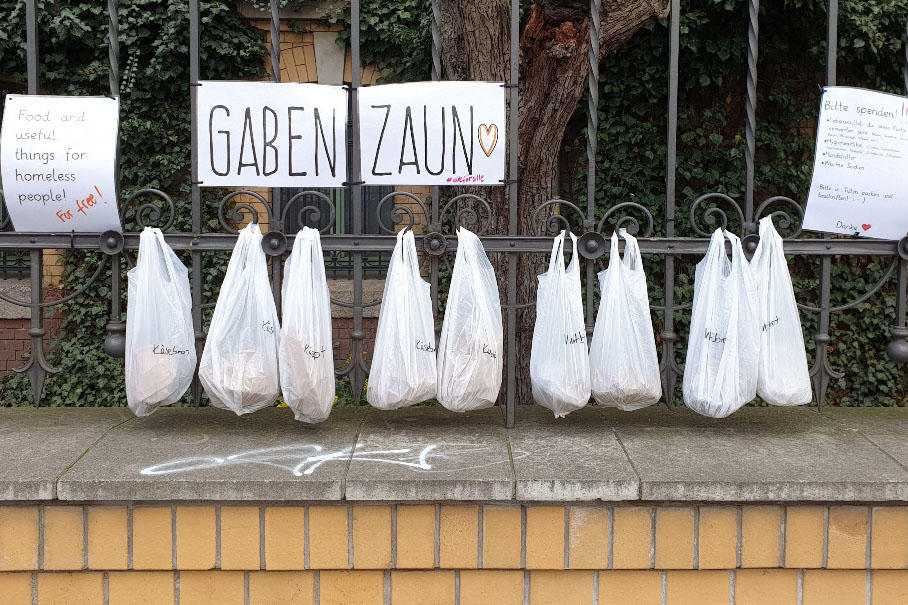Life during the Covid-19 Crisis
Researchers investigate the psychosocial effects of lockdown
Jun 26, 2020
Neighborly assistance: Many people are helping each other out during the coronavirus crisis, by doing their grocery shopping for example.
Image Credit: Shutterstock
How do contact restrictions imposed due to coronavirus affect the way in which people live and interact with one another? How have they changed social commitment, work, and well-being? Researchers from the fields of psychology, political science, and the social sciences are investigating these types of issues in research projects currently being funded by the Berlin University Alliance – the alliance between Freie Universität Berlin, Humboldt-Universität zu Berlin, Technische Universität Berlin, and Charité – Universitätsmedizin Berlin. It has also become apparent, however, that research is challenging under conditions that change almost daily.
This is why Patrick Mussel, a professor of personality psychology at Freie Universität Berlin, and his colleague Kai Horstmann from Humboldt-Universität zu Berlin, want to investigate how people experience the coronavirus pandemic in different ways, depending on their personality. How satisfied are they with their living situation? What are they worrying about? And: How will the coronavirus crisis – a “critical life event” – shape their lives in the future? In the current study, Patrick Mussel can build upon a longitudinal study (funded by the German Research Foundation, DFG) regarding the transition from school to work. In this study, the personality development of the respondents is examined over the course of several years.
Patrick Mussel says that it is not easy having to react so quickly in your own research. However, the data he is gathering for his project can only be collected now, under the immediate conditions of the pandemic and the measures imposed to contain the spread of COVID-19. Projects involving interviews and testing of subjects usually require evaluations and preliminary tests and are prepared over a number of years. “The fact that things are changing daily at the moment is a major challenge for our research,” says the psychologist.
“Many organizations and employees were simply not ready for an exclusive home office business model for so many weeks.” Jenny S. Wesche
Jenny S. Wesche, who holds a doctorate in organizational psychology and is based at Freie Universität Berlin, and Professor Annekatrin Hoppe and Elisa Lopper, two two researches in the field of occupational health psychology at Humboldt-Universität zu Berlin, have reflected on how these changes can be used productively. The aim of their project is to find out how the health and productivity of employees in the home office can be improved when this manner of working becomes unexpectedly essential due to infection control measures.
According to Jenny S. Wesche, the current working conditions of many employees is only comparable to a limited extent with the occasional working at home we were all familiar with before the Corona era. “Many organizations and employees were simply not ready for an exclusive home office business model for so many weeks, for example, with regard to technical equipment or access to documents in the home office.”
The organizational psychologist is focusing on the role of managers. In their survey, the psychologists want to take temporal and regional differences of the respective infection control measures and the resulting strain into account. If, for example, school closures are issued again – as has been the case recently in Göttingen or now in the Gütersloh district – this could be taken into account in the data analysis process because the test subjects are registered with their district. In order to facilitate the interview process for those who are currently under a lot of pressure, the researchers have optimized the survey for smartphones to allow for uncomplicated participation.
Everyday family life has also changed. Has parental stress increased during lockdown? A survey aims to find answers.
Image Credit: picture alliance /KEYSTONE
The current situation parents and families find themselves in is being explored by psychology professors Babette Renneberg of Freie Universität Berlin and Sibylle M. Winter, deputy director of child and youth psychiatry at Charité. Parents have been under particular strain in recent weeks because, alongside the changes in their job circumstances, in many cases they have had to look after their children who have not been able to attend daycare centers and schools. So how are they doing now? To what extent has parental stress increased, and what is the impact for the children?
A survey aimed at participants with underage children in their household seeks to clarify these issues. In addition, Charité is paying more attention to families who had, for example, already sought help from child protection centers or families with parents or children who suffer from a mental illness. Furthermore, a closer look at the situation in child protection centers and similar institutions during the lockdown is also part of the study in order to gain more clarity about the extent to which contact restrictions and quarantine have increased levels of domestic violence. “It is important to have reliable data on this important and sensitive topic,” says Babette Renneberg.
“We want to give a voice to those who find themselves affected by these developments.” Sabrina Mayer
There is also considerable evidence to suggest an increase in discrimination and assaults as a result of the spread of COVID-19. In May, the German Federal Anti-Discrimination Agency had already recorded more than 100 counseling cases. People of Asian appearance were particularly affected.
An interdisciplinary team from Freie Universität Berlin, Humboldt-Universität zu Berlin, and the German Center for Integration and Migration Research (Deutsches Zentrum für Integrations- und Migrationsforschung, DeZIM) wants to shed light on this topic on a variety of levels. A survey representing the entire population will not only record attitudes. According to Christoph Ngyuen, who holds a doctorate in political science and leads the project along with the migration researcher Professor Naika Foroutan from Humboldt-Universität zu Berlin, the survey will, by means of an experimental approach, help to investigate the dynamics behind racist attitudes.
Sabrina Mayer, who holds a doctorate in political science and leads the Data, Methods and Monitoring department at DeZIM, points out that the study also includes a study of diaries intended to show the inner perspective of the participants. She said, “We want to give a voice to those who find themselves affected by these developments. When do they consider an incident to be a racist assault? Or is it no longer considered to be newsworthy at all due to the microaggressions experienced repeatedly over the years?”
Stephan Heinzel, a professor of clinical psychology at Freie Universität Berlin, is focusing on people who are lonely and under psychological stress as a result of the pandemic. He wants to investigate what helps them to cope with crises in their everyday life.
To this end, the test subjects are interviewed several times a day via their smartphones over the course of a week. The frequency of their movements is also recorded with a motion detector as part of the study. The study is closely linked to Charité’s project named “SEA” in which people are asked to talk about their stress and relaxation patterns during the current crisis and which is still seeking participants.
In June, an article about this study was already published by Charité psychiatrists Shuyan Liu and Andreas Heinz in the journal Pharmacopsychiatry. The paper compares the findings of an online survey on the intercultural validity of measuring mental health in Germany and China during the Covid-19 pandemic. The researchers pointed out that in Germany, 24.1 percent of the 1007 individuals surveyed reported psychological distress, which was significantly lower than the number in China, where 34.4 percent of those surveyed reported psychological distress.
New forms of solidarity: Bags of food were attached to donation fences during the lockdown.
Image Credit: Julia Schmitz / Prenzlauer Berg Nachrichten
Professor of political science Swen Hutter and sociologist Professor Christian von Scheve from Freie Universität Berlin are working together with Jule Specht, a professor of personality psychology at Humboldt-Universität zu Berlin, on social cohesion in the crisis.
They are investigating how people’s solidarity behavior changed during the crisis and how they were no longer able to get involved in their community due to contact restrictions. On the one hand, new forms of social engagement have spontaneously emerged, such as donation fences or cases of neighbors helping each other out. On the other hand, because people fall into the at-risk category, they were no longer able to volunteer, for example, as reading mentors. There were no offers in place for refugees, and the distribution centers run by volunteers for distributing food to those in need, so-called Tafeln, were also forced to close in many places.
“We know from our experience with disaster research that social cohesion can diminish following extreme events.” Swen Hutter
“There are numerous scientific surveys going on at the moment,” says Swen Hutter, “but people seldom ask about solidarity behavior and volunteering activities.” The research team now wants to systematically explore this field. To this end, they have been surveying people from a total of five European countries about what motivates them to get involved in the community. An organizational survey is also to be carried out in connection with this.
“We know from our experience with disaster research that social cohesion can diminish following extreme events”, says Swen Hutter. “If we listened more closely to what civil society really needs right now, initiatives and projects could be supported in a more targeted manner and therefore also help to improve social cohesion.”
Researchers are rarely able to study changes in individual lives or in a society while they are taking place. This is what makes these rapidly developed research projects so fascinating.
The fact that researchers in Berlin have in many cases worked together on similar topics across institutional boundaries for many years has helped to either develop study models suitable for current issues or to expand existing projects. Nevertheless, research into the pandemic and its consequences calls for a large amount of creativity from researchers. Or, as Swen Hutter puts it, “It is a field of experimentation.”
This article was first published June 26, 2020 in the Freie Universität Berlin’s online magazine “Campus.leben”.
Further Information
Altogether, the Berlin University Alliance – the alliance between Freie Universität Berlin, Humboldt-Universität zu Berlin, Technischer Universität Berlin, and Charité – Universitätsmedizin Berlin – has funded a total of twelve research projects.
The Alliance was able to tender the funds as part of the so-called Grand Challenge Initiatives. Their goal is to fund interdisciplinary and cross-institutional research on particularly pressing social matters. For the first Grand Challenge, the Alliance picked the theme of Social Cohesion. The second common overarching theme for joint research will be Global Health, i.e., illness and health from a global perspective.



